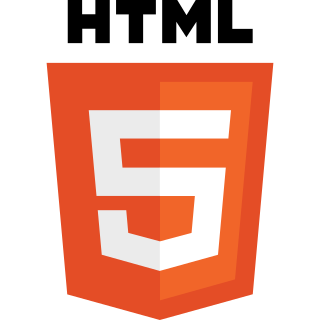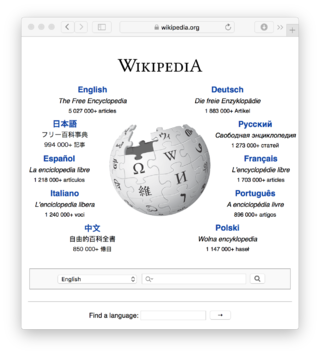Related Research Articles

The HyperText Markup Language or HTML is the standard markup language for documents designed to be displayed in a web browser. It is often assisted by technologies such as Cascading Style Sheets (CSS) and scripting languages such as JavaScript.

A markuplanguage is a text-encoding system consisting of a set of symbols inserted in a text document to control its structure, formatting, or the relationship between its parts. Markup is often used to control the display of the document or to enrich its content to facilitate automated processing.

The Standard Generalized Markup Language is a standard for defining generalized markup languages for documents. ISO 8879 Annex A.1 states that generalized markup is "based on two postulates":
The Semantic Web, sometimes known as Web 3.0, is an extension of the World Wide Web through standards set by the World Wide Web Consortium (W3C). The goal of the Semantic Web is to make Internet data machine-readable.

A wiki is an online hypertext publication collaboratively edited and managed by its own audience, using a web browser. A typical wiki contains multiple pages for the subjects or scope of the project, and could be either open to the public or limited to use within an organization for maintaining its internal knowledge base.

Wiki software, is collaborative software that runs a wiki, which allows the users to create and collaboratively edit pages or entries via a web browser. A wiki system is usually a web application that runs on one or more web servers. The content, including previous revisions, is usually stored in either a file system or a database. Wikis are a type of web content management system, and the most commonly supported off-the-shelf software that web hosting facilities offer.
In computer science, Backus–Naur form or Backus normal form (BNF) is a metasyntax notation for context-free grammars, often used to describe the syntax of languages used in computing, such as computer programming languages, document formats, instruction sets and communication protocols. It is applied wherever exact descriptions of languages are needed: for instance, in official language specifications, in manuals, and in textbooks on programming language theory.
RSS is a web feed that allows users and applications to access updates to websites in a standardized, computer-readable format. Subscribing to RSS feeds can allow a user to keep track of many different websites in a single news aggregator, which constantly monitor sites for new content, removing the need for the user to manually check them. News aggregators can be built into a browser, installed on a desktop computer, or installed on a mobile device.
The XML Metadata Interchange (XMI) is an Object Management Group (OMG) standard for exchanging metadata information via Extensible Markup Language (XML).

The Meta-Object Facility (MOF) is an Object Management Group (OMG) standard for model-driven engineering. Its purpose is to provide a type system for entities in the CORBA architecture and a set of interfaces through which those types can be created and manipulated. The official reference page may be found at OMG's website.
A lightweight markup language (LML), also termed a simple or humane markup language, is a markup language with simple, unobtrusive syntax. It is designed to be easy to write using any generic text editor and easy to read in its raw form. Lightweight markup languages are used in applications where it may be necessary to read the raw document as well as the final rendered output.
Sitemaps is a protocol in XML format meant for a webmaster to inform search engines about URLs on a website that are available for web crawling. It allows webmasters to include additional information about each URL: when it was last updated, how often it changes, and how important it is in relation to other URLs of the site. This allows search engines to crawl the site more efficiently and to find URLs that may be isolated from the rest of the site's content. The Sitemaps protocol is a URL inclusion protocol and complements robots.txt, a URL exclusion protocol.
Office Open XML is a zipped, XML-based file format developed by Microsoft for representing spreadsheets, charts, presentations and word processing documents. Ecma International standardized the initial version as ECMA-376. ISO and IEC standardized later versions as ISO/IEC 29500.
Scribe is a markup language and word processing system that pioneered the use of descriptive markup. Scribe was revolutionary when it was proposed, because it involved for the first time a clean separation of presentation and content.
The Microsoft Office XML formats are XML-based document formats introduced in versions of Microsoft Office prior to Office 2007. Microsoft Office XP introduced a new XML format for storing Excel spreadsheets and Office 2003 added an XML-based format for Word documents.
A structured document is an electronic document where some method of markup is used to identify the whole and parts of the document as having various meanings beyond their formatting. For example, a structured document might identify a certain portion as a "chapter title" rather than as "Helvetica bold 24" or "indented Courier". Such portions in general are commonly called "components" or "elements" of a document.
The Office Open XML file formats are a set of file formats that can be used to represent electronic office documents. There are formats for word processing documents, spreadsheets and presentations as well as specific formats for material such as mathematical formulae, graphics, bibliographies etc.
The Sweble Wikitext parser is an open-source tool to parse the Wikitext markup language used by MediaWiki, the software behind Wikipedia. The initial development was done by Hannes Dohrn as a Ph.D. thesis project at the Open Source Research Group of professor Dirk Riehle at the University of Erlangen-Nuremberg from 2009 until 2011. The results were presented to the public for the first time at the WikiSym conference in 2011. Before that, the dissertation was inspected and approved by an independent scientific peer-review and was published at ACM Press.
Pandoc is a free-software document converter, widely used as a writing tool and as a basis for publishing workflows. It was created by John MacFarlane, a philosophy professor at the University of California, Berkeley.
Vienna History Wiki is a freely accessible online collection of reference works in German about the history of Vienna. The main content of the wiki are persons, buildings, topographical objects, organisations, events and other items. It is written by Municipal and Provincial Archives of Vienna and Vienna City Library staff as well as external experts, and all content is subject to an editorial process and approved before publication.
References
- ↑ Chuck Smith. "Wiki Creole Press Release". wikicreole.org. Archived from the original on 9 October 2018. Retrieved 30 November 2008.
- ↑ Sauer, Christoph; Chuck Smith; Tomas Benz (2007). "Wiki Creole: A Common Markup" (PDF). Proceedings of the 2007 International Symposium on Wikis. ACM Press. pp. 131–142. Archived from the original (PDF) on 2008-09-07. Retrieved 2008-11-30.
- ↑ Martin Junghans; Dirk Riehle; Rama Gurram; Matthias Kaiser; Mario Lopes; Umit Yalcinalp (2007). "An EBNF grammar for Wiki Creole 1.0" (pdf). ACM SIGWEB Newsletter. Association for Computing Machinery. 2007 (Winter): 4. doi:10.1145/1324960.1324964. ISSN 1931-1745. S2CID 43278300 . Retrieved 2008-11-30.
- ↑ Martin Junghans; Dirk Riehle; Umit Yalcinalp (2007). "An XML interchange format for Wiki Creole 1.0" (PDF). ACM SIGWEB Newsletter. Association for Computing Machinery. 2007 (Winter): 4. doi:10.1145/1324960.1324965. ISSN 1931-1745. S2CID 15913866 . Retrieved 2008-11-30.
- ↑ "Creole 1.0". WikiCreole. Archived from the original on 2012-05-03. Retrieved 2014-01-25.
- ↑ "Special Support for Creole". Atlassian Documentation. Retrieved 2018-02-03.
- ↑ "Creole format - MoodleDocs". MoodleDocs.
- ↑ "Creole support in PlantUML". PlantUML.